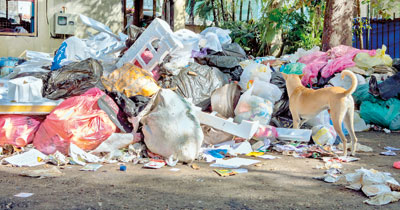News
Public urged to boycott polythene and help traditional bag weavers
Cottage industries of Sri Lanka will need time to catch up with demand for shopping bags made of natural materials when the ban on polythene bags and polystyrene containers becomes effective in September despite protests by manufacturers.

City garbage mostly consists of polythene. Pic by Sameera Weerasekera
Households are also being encouraged to boycott polythene bags for the sake of freeing Sri Lanka from the non-biodegradable garbage mountains nightmare.
There are those who already use reusable cotton tote bags for their shopping, but they are few. Colourful handloom bags are also available.
People are also being urged to use re-usable lunch boxes and banana leaves when they can.
The Central Environment Authority insists that the ban will be imposed this time on polythene lunch sheets, grocery bags, shopping bags and polystyrene food containers. It has failed on several previous occasions.
Waste Management (Plastics), Director, Ajith Weerasundera said there will be no phase out period. “The ban has been approved by the cabinet and will be implemented on 1st September,’’ he said.
Statistics reveal 27% of the garbage collected from households contain polythene and polystyrene products.
On two occasions, the CEA tried to ban polythene – once in 2007 when Maithripala Sirisena was Minister of Environment. The law was never implemented. Again in December 2015, after Mr Sirisena became President, he tried to revive the law and failed.
Meanwhile, leading supermarkets, shops and retail outlets have been generously handing out polythene shopping bags. Vendors at wet markets are also liberally providing polythene bags – even for a single papaya, or a bunch of plantains. But alternatives are available.
The head of the Field Ornithology Group of Sri Lanka, Professor Sarath Kotagama said: “Discourage the consumer from using the product and the businesses will stop production. There are always alternatives – we should take our own traditional ‘malla’ for shopping.’’
He said waste paper should be used to make grocery bags.
“If third world countries including Bangladesh and Nigeria have done it we can do it. We need polythene only for items that have a shelf life,’’ he said. Also it is important that biodegradable, reusable and photo-degradable material are used to wrap food. “This way we can push out non-biodegradable polythene/polystyrene from our markets.’’
He added: “Consumer resistance is crucial. They can give the message to manufacturers by boycotting polythene and polystyrene products. When consumer consumption patterns change the manufacturers will change, too.’’
But traditional reed, jute and palmyrah industries are not yet ready to provide alternative products for shopping and packaging. Many of the cottage industries need support, specially from the state. The lack of demand and high costs have also affected the traditional reed products industry.
A study done by the Ruhuna University in the Kalutara District revealed that most people owned enough land for reed cultivation and 65% of the women had the technical knowledge to make reed products including shopping bags and baskets. The study also recommended diversification to revitalise the industry that could bring quality products into the market.
The palmyrah industry which could step in is largely confined to the northern region. A study by the Hector Kobbekaduwa Agrarian Research and Training Institute on palmyrah products found that it could fill only around 2% of the void created by the polythene and polystyrene ban.
Additional Director, R L M Jayatissa said the industry was underprepared. “It is a cottage based industry it would take time to take over,’’ he said.
However CEA’s, Weerasundera sounded positive and said these industries are being looked at with a plan to revive them. He suggested that people use lunch boxes and banana leaves instead of lunch sheets and also use traditional bags for shopping.

